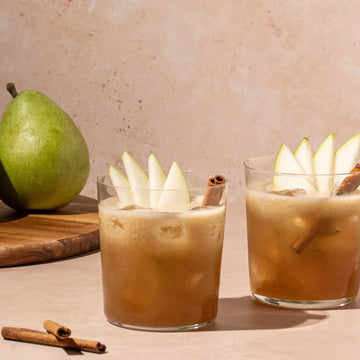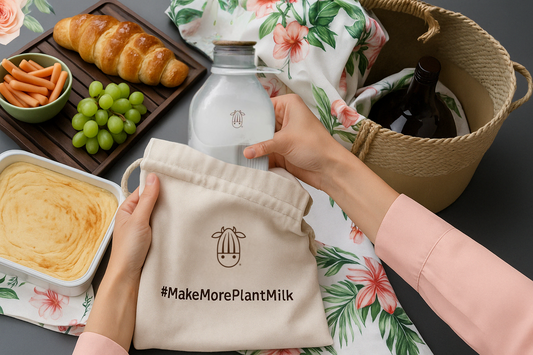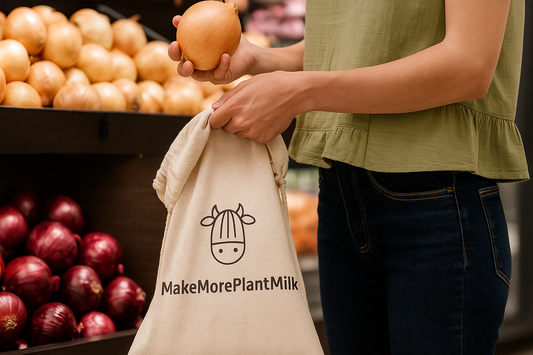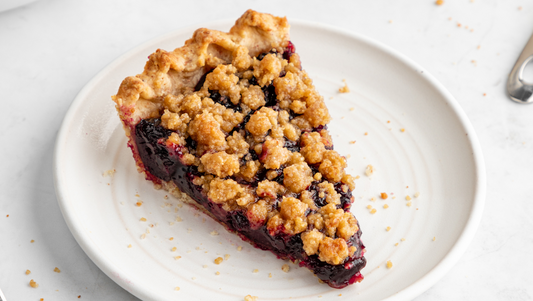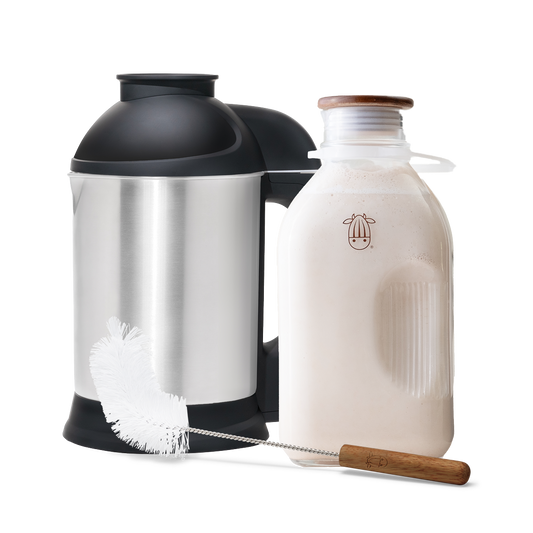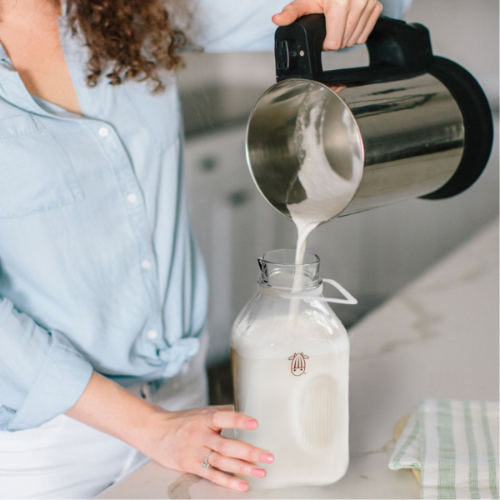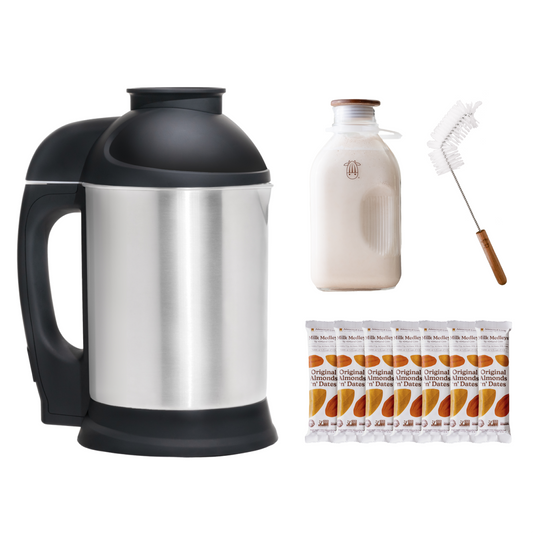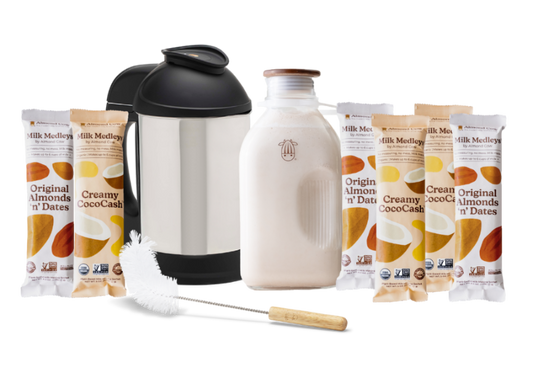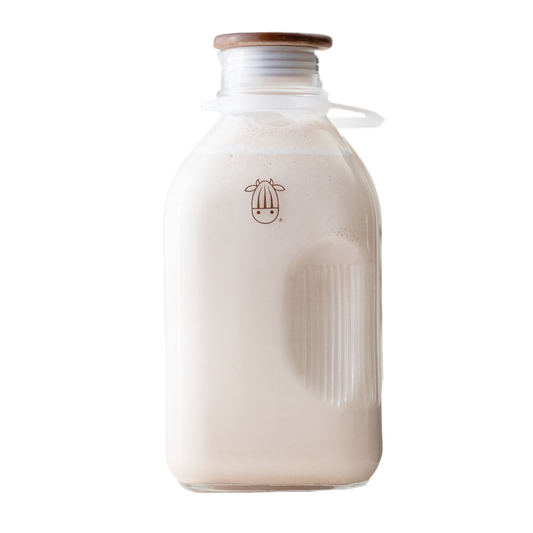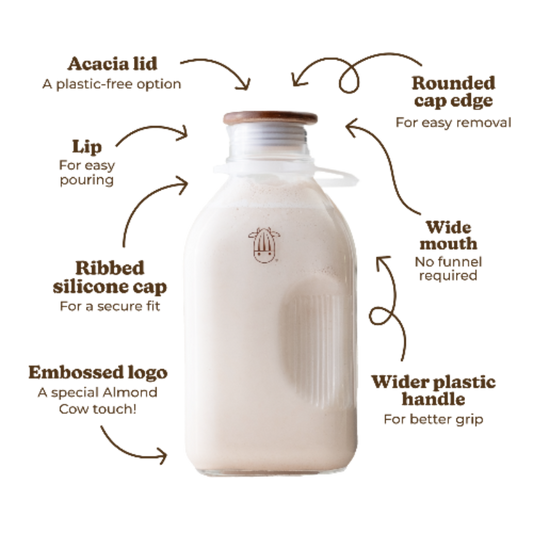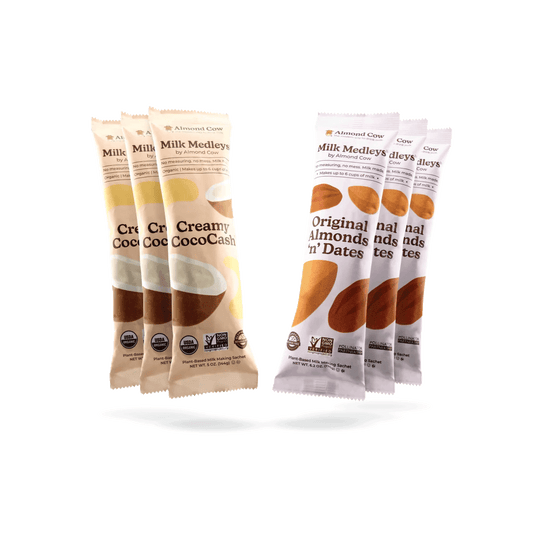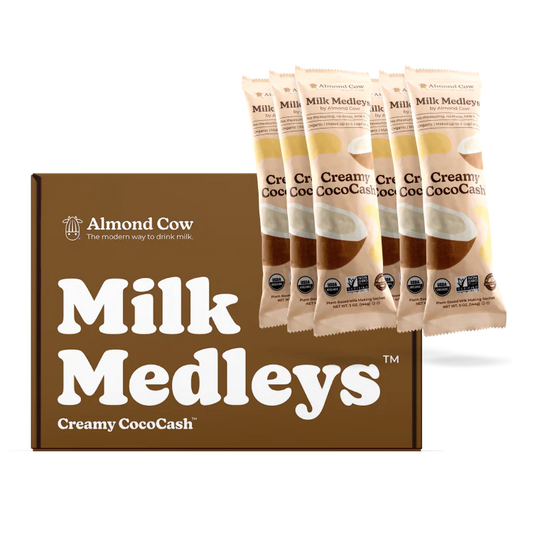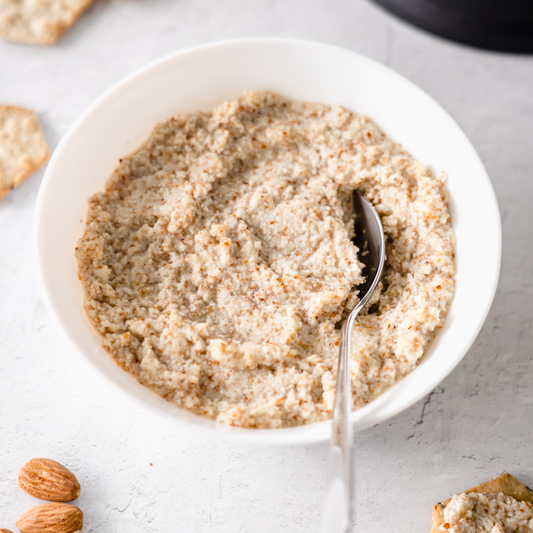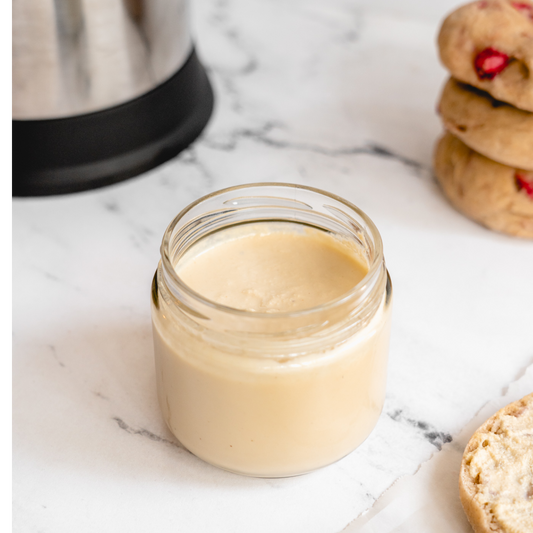Ultimate Guide to Making Almond Milk at Home | Fresh & Nutritious
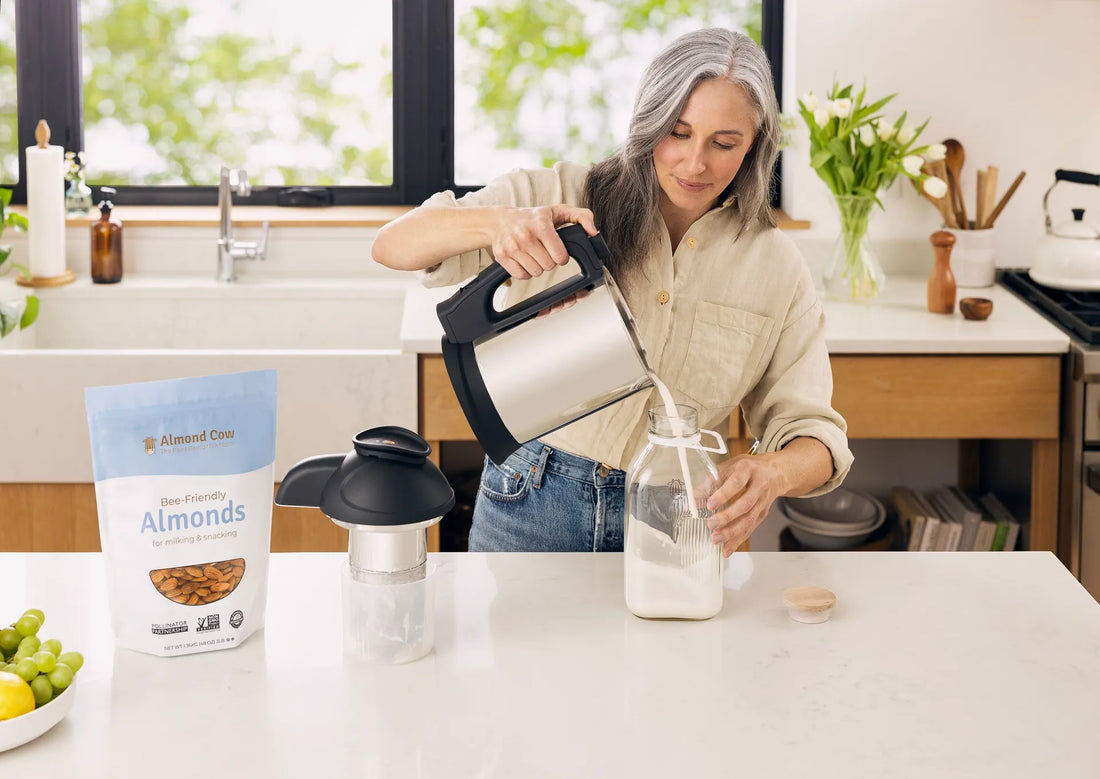
This is the quintessential guide to making homemade almond milk using your Almond Cow. All natural, delicious almond milk in a snap, made right in the comfort of your own kitchen. Say goodbye to soaking almonds, nut milk bags, and store-bought milk.
Our recipe is simple and has a light, nutty, vanilla flavor. It requires only two ingredients (almonds and water) with optional add-ons depending on your taste preferences. Whether you're lactose intolerant or just prefer a plant-based lifestyle, this is the perfect milk alternative to use in smoothies, cereal, lattes, baking, or just on its own!
Almond milk, like most nut milks, is made by blending almonds and water and then straining out any residual nut pulp. (Best of all, with the Almond Cow, the straining is automatic and done for you without all the mess.) It has a mildly nutty flavor and smooth texture, which makes it an incredibly popular choice for those who are looking for an alternative to dairy milk. Almond milk is arguably the most popular of all nut milks, and for good reason—it’s nutrient-dense and super easy to make with readily available ingredients at the touch of a button.
Common Almond Milk Questions:

What is almond milk?
Almond milk is just like any other plant-based milk, when you get down to the nuts, seeds, or grains of it. Basically, it’s a plant-based milk made of almonds and water. Often, flavorings such as vanilla and sweeteners such as dates are added to the mix as well to enhance the natural flavor/sweetness of the milk.
Most of our almond milk and creamer recipes use salt as a natural preservative, maple syrup or dates for a touch of sweetness, and a splash of vanilla for its flavor and aroma.
What are the benefits of almond milk?
Almond milk is an alternative to dairy and/or nut milk that is low in calories, rich in Vitamins D & E, and low in sugar, making it a nutritious plant-based milk.
Is almond milk gluten-free?
Almond milk is naturally gluten-free. It’s made from almonds, which contain no gluten. However, almonds may be contaminated with gluten in production. If you want or need completely gluten-free almond milk, purchase certified gluten-free almonds.
How many calories are in almond milk?
Regular almond milk has roughly 68 calories per 1 cup serving. There will also be some calories added if you include a sweetener or any other ingredients.

Is almond milk paleo?
Yes, almond milk in its purest form of just almonds and water is considered paleo.
Is almond milk keto?
Yes, unsweetened almond milk is very low in carbs, making it a good milk alternative for those following a keto diet/lifestyle. There is approximately 1 carb in 1 cup of almond milk.
How much protein is in almond milk?
Almond milk contains around 3g of protein per 1 cup serving, making it a lower source of protein than traditional dairy milk.
How much fat is in almond milk?
Almond milk typically contains around 6g of fat per 1 cup serving.

How do you make almond milk at home?
Similar to other alternative milks, making almond milk at home typically involves blending the almonds with water and then straining out the solids. The Almond Cow is the easiest way to make almond milk at home. You can create 2-6 cups of almond milk at the touch of a button. Plus, you control what goes in your milk with a plant-based milk maker, like Almond Cow. No preservatives, artificial flavors, or fillers are required.
What almonds should you use to make almond milk?
Almond Cow sources and sells high quality almonds that are perfect for milking or snacking. Our raw almonds are the ideal size to produce silky smooth almond milk, every time. They are:
Raw, Flash Steam Pasteurized
Glyphosate Residue Free - Approved by DetoxProject
Bee-Friendly: Pollinator Partnership Approved
Non-GMO Project Verified
USA Grown
Halal & Kosher
Get your own bag of Almond Cow Bee Friendly Almonds here.
Why Make Your Own Almond Milk Rather Than Buy In Store
Making your own plant-based milk at home is better for your wallet, your health, and the environment. Plus, you get to be creative and choose the ingredients you’d like. Want strawberry infused almond milk? Simply add fresh strawberries to the filter basket with the almonds and your milk will come out a beautiful pink color with a delicious strawberry-infused flavor. What about lavender, chocolate, vanilla, or honey? You name it, you can make it in the Almond Cow and one of the best things about almond milk is the ability to infuse so many different flavors and they all pair with the almonds so beautifully.
Store-bought almond milk is often full of additives - texture additives (think canola oil and xanthan gum), artificial flavors, and preservatives with names too complicated to pronounce. With Almond Cow, you control what’s in your milk. We even have a nutrition calculator on our site, where you can get the exact nutritional breakdowns of the milk and pulp that you make in your Almond Cow. Check it out here.
There are also so many delicious treats you can make with the leftover almond pulp. Check out our amazing lleftover pulp recipes like Almond Butter Cookies and Almond Pulp Banana Bread. You can even freeze your leftover pulp into pulp cubes and then use them in breakfast smoothies for added flavor, nutrients, and creaminess. Check out one of our favorite smoothie recipes, our Green Smoothie with Almond Pulp Cubes, to see how easy a healthy breakfast or snack can be.
Best of all, making homemade almond milk with the Almond Cow is more affordable than milk you can buy from the store! If you use one cup of almonds—which we recommended for making milk in the Almond Cow—you’ll be saving about 30% compared to store-bought milk. Our 3 lb bag of Almonds can make 9 jugs of almond milk—that's only $2.55 per jug! What’s more, you’ll be drinking a milk that’s much richer in almonds! Did you know store-bought milks contain as little as 3 almonds per cup of milk? The rest is just water, gums, emulsifiers, and sweeteners. With the Almond Cow, you’re getting anywhere from 30-90 almonds going into the making of each cup, and the only sweeteners are things you put in yourself. With the Almond Cow, you have total control, and everything depends on how you like to make your milk.
Are there environmental benefits to choosing almond milk?
Plant-based milks, in general, require less water and resources to make than dairy milk, and almond milk is no different. But how does almond milk stack up against other non-dairy milks? The production of almonds emits fewer greenhouse gas emissions and uses less land than some other popular plant-based milk ingredients, like soy. However, almonds require a significant amount of water to be grown. If you are looking for the most environmentally friendly plant-based milk, we recommend oat milk.
Homemade almond milk is even more environmentally friendly. Just think about all those single-use plastic containers from store-bought brands. An Almond Cow in your home can help you save over 125 single-use plastic containers per year. That’s over 1000 plastic cartons every 10 years per household!
Imagine if a mere .01% of the US population did this - that’s over 43 million plastic cartons kept out of landfills and our already polluted ocean.
Get started making your own plant-based milk today and prioritize the environment, your health, and your wallet! We recommend the Almond Cow Starter Set, or our 220v Almond Cow if you’re outside the U.S., which comes with everything you’ll need to get started. You’ll be serving up a creamy, delicious, healthy cup of homemade Almond Milk in no time. Cheers!
Oat Pulp Pancakes with Hazelnut Spread
Make a delicious, wholesome stack of our Oat Pulp Pancakes, topped with homemade hazelnut spread. We promise not to tell if you don't share!
Read MoreBeet Latte
Looking for a unique twist on the classic latte? Try our Beet Latte for all the deliciousness of a regular latte, combined with the nutritional power house of beets!
Read MoreIrish Creamer
Start St. Patrick's Day off right with Almond Cow's delicious Irish creamer recipe.
Read MoreRecipe Categories
Filter By
Additional Blog Detail:
Main Ingredient
Keywords
Meal occasion
Named holiday recipe


